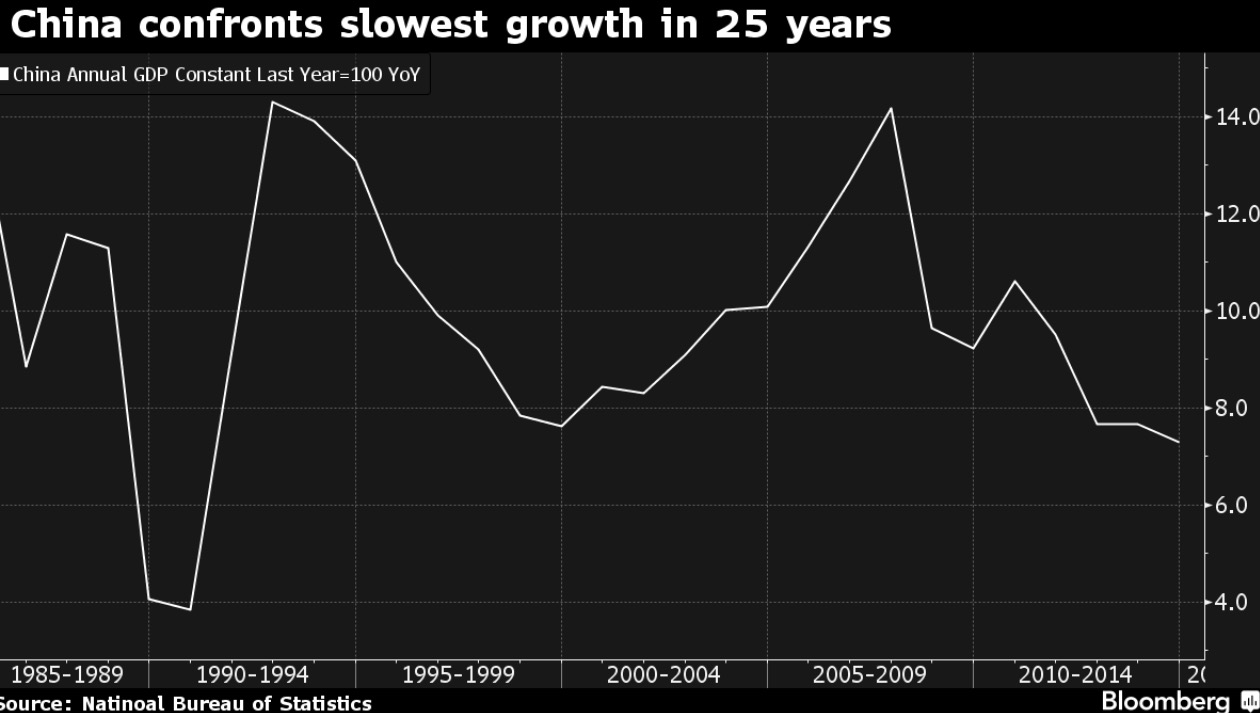The great ‘command economy’ of China is having all sorts of fits trying to slow down its epic deceleration of growth. Ever since the government began to crack down on the wanton corruption and shenanigans that made China the capitalist dreamhouse Steve Wynn was born to waste shareholder money in, the economy has collapsed.

SUPRISE!
Now that growth is at 1990 lows, a year when Vanilla Ice was the shit, the PBOC is desperate to figure out ways to draw the rural rice farmer out from the fields into a ghost town condo and common stock portfolio.
Monetary policy must be more “flexible” and fiscal policy more “forceful” as leaders create “appropriate monetary conditions for structural reforms,” according to statements released at the end of the government’s Central Economic Work Conference by the official Xinhua News Agency on Monday. It said the fiscal deficit ratio should be raised gradually.
Cutting costs for businesses “will be a major task” next year and the government should streamline administrative procedures, cut taxes and fees, and reduce social security contributions to help lower expenses, according to Xinhua. Financial regulators should reduce financing costs for companies and help “normalize interest rates” to benefit the economy. Authorities also should consider lower value-added taxes on manufacturing, it said.
Additional Central Economic Work Conference pledges, as outlined by Xinhua reports:
Further steps to “guard against and defuse financial risks” in 2016, and to effectively defuse local-government debt risks.
Promote “mass entrepreneurship and innovation” and continue to implement an innovation-driven strategy.
Reduce poverty by establishing a detailed register of the poor population and offering tailored assistance.
Offer more support for companies to upgrade technology and equipment, and reduce debt with “innovative financial policies.”
Beef up agricultural production to ensure food security and stable income growth for farmers by modernizing infrastructure and technology to boost capability and quality.
The case for additional stimulus has been strengthened by capital outflows after an August currency devaluation, some weaker-than-forecast economic data and the aftermath of a stock-market slide that started in June. Inflation data for November showed there’s scope for looser monetary policy, with consumer prices rising about half the government’s targeted pace and producer prices falling for a record 45th straight month.
Robust consumption and strength in services hasn’t proved enough to offset the drag from slumping old-economy sectors including steel, coal and cement. President Xi said Nov. 3 that average annual growth must be no lower than 6.5 percent in the next five years to realize China’s goal of doubling 2010 output and per capita income by 2020. Growth will slow to 6.9 percent this year and 6.5 percent next year, according to the median of estimates Bloomberg surveys of economists.
Goldman’s take
“Although the overall cyclical policy stance is set to be ’steady’, the tone on fiscal, monetary and other policies was modestly dovish,” economists at Goldman Sachs Group Inc. led by Song Yu wrote in a note. “The more positive cyclical policy tone from this conference makes us somewhat more comfortable with our forecast of only a moderate growth deceleration in 2016.”
I think it’s pretty obvious that the law of large numbers are taking hold of China. You just can’t continue to grow an economy of that size at 10% per annum without grave ramifications. The commodity super cycle is being unwound, born in China. The great engine of global growth is now sledding down the other side of the mountain. I suppose we could draw comparisons to when the US overtook Britain as dominant economic power and how our economy slowly, but surely, had to decelerate to a reasonable growth rate. The world survived and stocks kept making new highs.
On the other hand, we didn’t have an inter-connected financial system wrought with derivitive based products that could threaten our ability to finance the delivery of food back then. So, this time might be different, at least for awhile.
If you enjoy the content at iBankCoin, please follow us on Twitter





Alright stop, decelerate and listen.
^^ This!